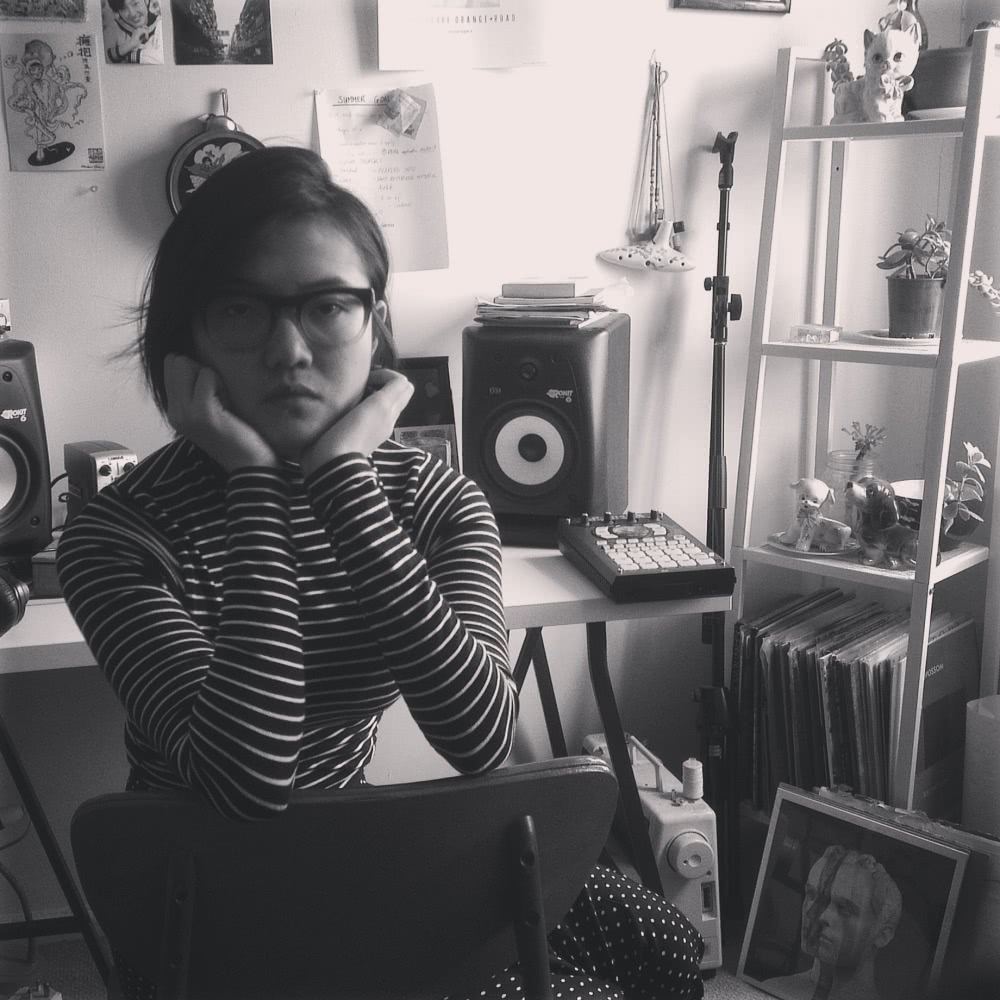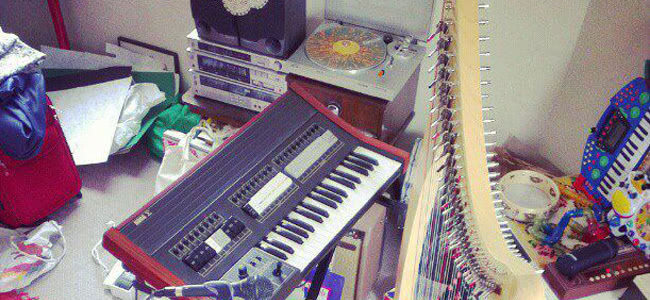There comes a time in most bands’ careers when they have an arsenal of killer tracks ready to move from the stage into a more tangible and or permanent format. Whether it be mp3, vinyl or the overlooked CD it’s important for bands to have a catalogue of recorded music.
There’s always the tricky question of how should we record? Should you visit a studio for a few days, lay down some tracks and hope they turn out for the best? Or do you take the more leisurely, but time intensive approach of recording at home? Both have their pros and cons, but we’ve spoken three very different acts acts who have personally found the DIY approach the way to go.
From home studios, to dining tables, to haunted theatres, each of these acts have taken varied approached to the DIY road, but still produced some incredible releases, they were kind enough to impart some wisdom for musos out there wanting to record their own sounds.

Tim McPhee is part of Newcastle band Firekites. The band are about to release the ir new album Closing Forever Sky (out August 15th via Spunk Records), the long awaited follow up to their 2008 debut The Bowery. Closing Forever Sky was written and recorded at the dining table of Tim’s sea-side home.

Rainbow Chan is a Sydney based singer/ producer. Her 2013 debut EP Long Vacation was self recorded, and released by New York via Brisbane online label Silo Arts. Since the release of Long Vacation, Rainbow has also release a remix EP featuring Nick Zinner Yeah Yeah Yeahs) and performed at Outside In Festival And Vivid Live as part of Astral People’s Since I Left You tribute to The Avalanches.

Jan Skubiszewski is one of Australia’s most in-demand production talents. He’s worked with some of the country’s most prolific artists, including Dan Sultan, John Butler Trio, ILLY, Ella Hooper, Phrase, Owl Eyes, and many more, in addition to maintaining his own musical project, Way of the Eagle.

Mitch McDonald is the singer and guitarist for Perth based rock band The Love Junkies. The band are about to release their second album Blowing On the Devil’s Strumpet via Bütsikatsic Records/ MGM Distribution this September 5th. The album was recorded by Mitch in the ‘haunted’ Astor Theatre in the Perth suburb of Mt Lawley.
Make Sure You Have The Necessary Gear
A studio is only as good as its gear.
Rainbow: “Depending on the type of music you make, it is completely viable to record your music at home. For the ‘bedroom producer’, music making and the DIY aesthetic have become synonymous. All you really need is a computer, recording software, a basic interface and perhaps a decent mic to create anything you want. Sampling has never been easier with the array of affordable hardware now and downloadable audio packages.”
Mitch: “You can get away with little gear depending on what kind of sound you are chasing. All you need is a laptop, an interface, a mic lead, an SM57, a microphone stand (easy to make), a coat hanger and a pair of stockings. Donʼt wear the stockings. This will not help you. Instead make a pop filter and tape it to your mic stand and boom! You got yourself a studio. If you feel like getting crazy, throw in a midi keyboard mister money bags. Remember, if you think it sounds good, it probably does.”
Tim: “I do believe there is one piece of kit you really don’t want to compromise on and that’s monitors- speakers or headphones. You need to be working with a neutral reference point. Whether it be a second hand pair of NS-10M’s (speakers) or a new set of Sennheiser HD600’s (headphones). You won’t need to spend a fortune, but if you invest in the right set of Monitors you will have them for years and they will immensely improve your sessions/mixes.”
Know Your Gear
If you’re going to use it, get to know what you’re doing.
Tim: “You don’t actually need that much recording gear to make a record these days, regardless of what you have, top end or entry level, learn how to use it. As you would practice your instrument or rehearse with your band, practice using your recording gear.
Put in the time to learn all about what you have, how to use it, and how to get the most out of it. Yes, thumbing through manuals can be really laborious. I’ve found that online demos can be really useful, they seem to get to the point much faster than reading a digital pdf.”
But Start Small
Jan: “I started small with a Pro Tools rig and a few pre-amps. Harry Angus and I made the first Jackson Jackson record with two microphones and limited gear so we were forced to experiment and come up with creative sounds.”
“Eventually I began purchasing more equipment but took my time and researched different outboard gear, mics and synths, trying to work out what was right for me. I still don’t think of myself as a highly technical producer, but I love using studio spaces creatively and pushing the gear hard.”
“I now have a beautiful space with lots of toys to play with, but I am constantly reminded that it all begins with good songs. The gear is useless without a strong idea so I encourage others to rely more on their writing and creativity instead of racing out and buying a load of gear.”
Plug-Ins Are Your Best Friend
The most flexible and affordable way to sounds like a million dollars.
Tim: “Listen, really listen… take that extra time before recording to get the sounds just right. Trust your instincts, trust your ears. I think one of the biggest achievements in the world of digital recording this last few years would have to be plug-ins. They’re now actually so close to the real outboard units it’s scary.
I love Universal Audio. Their Neve, Trident, Pultec and Helios Eqs are stunning, I use the Studer A800 Tape recorder all the time and their RE-201 Space Echo is spot on. I still run my old original RE-201 for tracking, but for mixing, the plug-in is brilliant.
Sound Toys are also producing some of the most powerful delay and modulation plug-ins yet. Check them out. They’re creative tools in themselves.
It’s so easy to get carried away with plug-ins. They’re flexible, affordable, and just so damn good. Before plug-ins, you pretty much needed to be in a serious professional studio to get access to this gear and LOTS of money!”
Don’t Be Afraid To Borrow
If you haven’t got it, and can’t afford it, borrow it.
Tim: “As far as instruments go, make do with what you have. Most of the time, limitations provoke new and creative ways of getting the result. Improvise. Having said that, don’t be afraid to ask your friends or colleagues to borrow gear. As they say, what goes around comes around.”
Experiment, Rehearse, and Practice
Experimentation and practise are the best ways to hone your craft and discover new sounds.
Rainbow: “I’ve recently been experimenting with mixing my DIY home vocals and studio vocals. I feel some music can sound a bit formulaic if the producer becomes too engrossed in her/his recording software. Unless that clinical approach is your intention, I encourage you to be creative and mix various sound sources to make something unique.
Don’t think about your tracks as pieces of audio locked to a grid; allow space for human error as that is often where the magic happens. Several interesting albums have been recorded on a laptop mic and in strange spaces like airports or hotels, which goes to show that if you have a strong vision and exercise your imagination, you don’t need to spend heaps of money to create something great.”
Tim: “At the end of the day, regardless of what gear you’re recording with and where, the most important element by far are the songs. If the songs are there, it will translate. This feels like another really obvious point to make but it’s just so important. Refine your arrangement, experiment, rehearse, practice.”
Mitch: “if you think it sounds good, it probably does. Although computers are amazing and you can manipulate and fix all your fuck ups and dodgy engineering with plug-ins and stuff, thereʼs nothing wrong with taking a little extra care in making shit sound dope.
If you bang a snare and it sounds like shit, once it travels through a mic, gets converted from analogue to digital and is wobbling around on your computer screen, itʼs still going to sound like shit. Spend hours on your drums. Tune and tape to taste. Once youʼre done, spend another hour moving and swapping mics until that kit is sounding the way itʼs meant to.”
Consider Getting Professional Assistance
Getting a professional ear to mix and master can make a huge difference.
Rainbow: “There is an abundance of forums and tutorials on recording and mixing techniques available online. Find a space that you feel comfortable in without too much interference or noise. Although recording at home has its benefits (it’s highly personal, you work at your own pace, easy access to the tea cupboard) I think it’s worthwhile to get your music professionally mastered. This really makes a difference.”
Before You Press Record
Jan: “One of the most important things I have learnt is to work with the band from the start of a project to form a clear idea of what you want something to sound like… before you begin recording. Build an entire sonic aesthetic world for each project.”
“The creative process involved in making music is seemingly limitless, but I find that forming a clear idea for each project early on means you can quickly identify what is working or what needs to change.”
“I try to play songs or pieces I am working on to friends as often as I can to get their feedback, and I often go to my father for advice on projects. I think having a mentor or someone whose opinion you really value is very important.”
“It’s hard to hear honest opinions on something you are emotionally invested in, but it often helps me get the best results.”
Set Yourself Deadlines
Though it’s nice to take your time, without deadlines records don’t materialise.
Mitch: “The beauty of engineering, producing and mixing your own records is that you run the project at a more natural pace. When youʼre counting down studio time with all that stress on your pocket, itʼs easy to let a little anxiety get in between you and a good take. You must set yourself deadlines. Reasonable ones. Every band is different but still, when approaching the tracking process everybody should be rehearsed.
Thereʼs no bigger vibe killer than somebody failing to deliver the goods. If you havenʼt nailed it by the fourth or fifth take, the air starts getting a little sour. Those kind of shenanigans suck the fun out of the creative process. Ours is roughly five days… Any longer than that and weʼre just playing with ourselves.
The same goes with the mixing process. Mixing is incredibly fatiguing. Well, I find it to be. Itʼs my favourite part of the whole process yet it has brought me to the verge of tears many a time. You have to remember, you are your own worst critic. Mixing someone else’s track is a breeze. You pull the thing up, clean it, make it sound boss and hand ball it to mastering. But when itʼs your baby…. itʼs never good enough. I tend to devote a set amount of hours per song, and only do a couple a day, otherwise my ears get drunk and I lose my direction.”
Timing Is Everything
Remember if it’s not a professional studio, it’s not soundproof.
Tim: “Ok, so timing is quite possibly the single most important factor in making a record at home. While being able to record at home is incredibly convenient, you don’t want it to become an in-convenience with those you live. Show a little respect and it will reward in ways far beyond the opportunity to record at home.
[include_post id=”411675″]
For bigger sessions book in the dates as far out as possible, then plan your session around the ideal sound conditions. For example, Sundays in Newcastle are shocking for lawnmowers, late afternoons in Summer are the worst for crickets, cicadas and cars. While some natural field sounds can really add to a recording, most of the time they don’t and can quite simply be avoided with a little planning.
Explore the fertile midnight hours. I’m continually surprised at just how much amazing work can be achieved deep into the night. Whether you’re writing, tracking or mixing, so often there is a certain spontaneous creative clarity in the air. The calm of the house, the stillness of the streets outside…the quiet. Perhaps it’s because your mind is usually dreaming at that hour, I don’t know, there’s just something really cool that happens.”
It’s Okay To Be Nervous
Jan: “Before I begin a new project I often feel nervous. I remember flying over to Fremantle to begin recording Flesh and Blood with The John Butler Trio, which ended up winning the ARIA award for Best Blues and Roots album.”
“On the flight over I began feeling a little nervous to be working with such an iconic Australian band. Within a few hours in the studio together, we realised we had the same passions and were soon laughing about the same things. I think this is very normal, and often the bands are nervous as well.”
“It’s important to remember that artists often don’t know exactly what or who they are. Some producers seem to play a dominant role, making sure everyone knows who’s in charge.”
“I see my role as a producer much more in terms of trying to help each band find its own unique sound and aesthetic – a collaboration rather than something directed from above.
“I always try to keep an open mind, and I learn something new from everyone I work with. Collaborating with someone is like having a conversation: things have to move both ways.”
Jan Skubiszewski is running an exclusive four-day production masterclass at Way of the Eagle Studios from 11th August – 14th August, check here for more info.




































